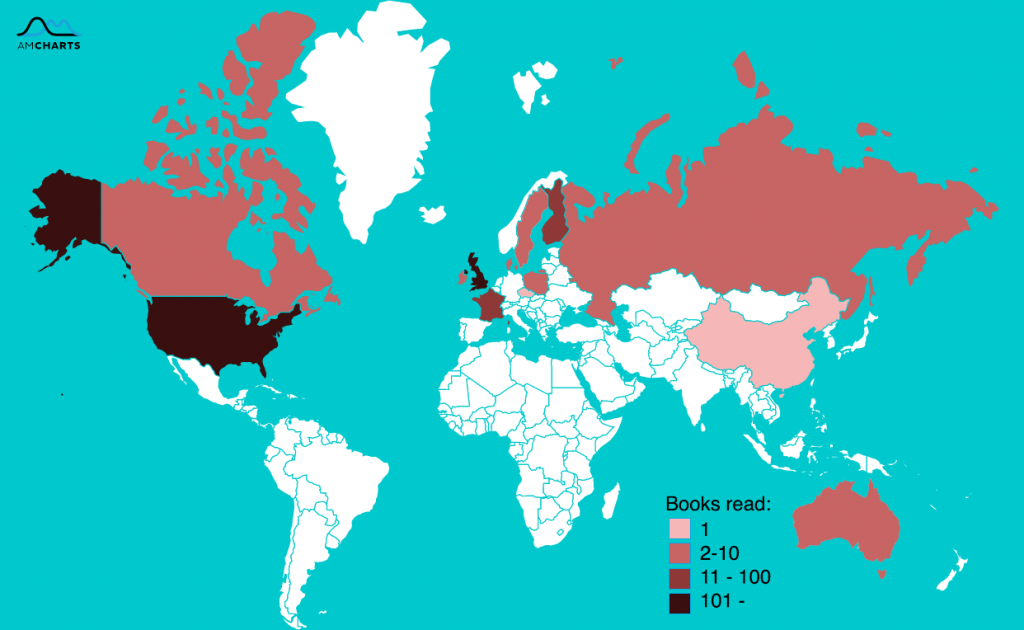The other day I got to thinking about the origin countries of my sci-fi bookshelf (also my non-scifi bookshelf, but it’s not pertinent). Practically everything I own or read comes from the two big English-speaking countries, UK and USA. This sounds like something that should change.
Originally the idea came to me, because I stumbled across A Year of Reading The World. After some memory rummaging and a couple of Web searches, it seems I’ve only read science fiction (1) from thirteen countries (as they exist at the moment), with the rough distribution as follows (2):

Even though country does not equal culture, this looks pretty narrow-minded. I realised that I hardly even know of any science fiction from outside my own easy-to-access bubble. As a writer writing in an obscure language, even as a privileged European white male, this is not how I’d prefer the reading landscape to look like. I’m going to do my part to change it.
So, the challenge: By the end of April 2016 I will almost-double the number of countries I’ve read at least some science fiction from – from 13 to 25. At least half of the increase needs to come from outside Europe. Also, by the end of April, I’m going to have a reading list that will increase this number to 50 by the end of April 2017, if that’s possible. (The world has 206 countries at the moment. I hope that a quarter of those have writers who have published science fiction in a language I can read.) I challenge the reader to do the same: either double the amount of countries their sci-fi originates from, or add twelve countries to their list, whichever they prefer. If your selection of countries of origin is as narrow as mine, doubling it should be easy!
Some rules and definitions:
For “science fiction”, I’m using a very broad definition of the genre that includes fantasy, supernatural horror, magical realism etc. Kafka, Bulgakov, Korkea-Aho, and me have all written science fiction.
For the amount read, it has to be at least a novel or a short story collection. I do not intend to quibble about word amounts. If you can call it a whole book, it counts.
For countries, I’m using the Wikipedia list of sovereign states, as it stood on Dec 9, 2015. Since I’m aiming for cultural representation, I’ll try not to be too weasely with authors. So Arthur C. Clarke is a Briton, not a Sri Lankan.
To business!
I’ve already picked out a couple of books to read
- Lagoon by Nnedi Okorafor (Nigeria)
- Utopia by Ahmed Khalid Towfik (Egypt)
- Death Sentences by Kawamata Chiaki (Japan)
Feel free to suggest more exotic science fiction in the comments. Unfortunately for a project like this, I only read English and Finnish. (I’m theoretically able to read Swedish, but it would be incredibly slow.) My favourite subgenre is hard-ish science fiction, but really anything good or interesting goes. Novels are preferred to short story collections, but interesting short story collections will get considered. Stuff available as a DRM-free ebook works best, but I’m quite able to kill any DRM I come across.
1: Only counting entire novels or short story collections.
2: Map created with Pixel Map Generator by Amchart. The map is far from perfect: it doesn’t show all countries (esp. around Oceania), and I’m really not fond of the Mercator projection either. However, this was the online map tool I found with an applicable license and a reasonable UI, so, for now, colonialist / cold-war propaganda it is, despite the irony. I’ll change it if something better turns up.
Picking up some obvious and/or favourites
Italy:
Italo Calvino: Cosmicomics, Cloven Viscount, The Nonexistent Knight etc.
Umberto Eco: Foucault’s Pendulum (I count it as spefi, some might not)
Stefano Benni: Baol
Argentina:
Jorge Luis Borges: most anything
Julio Cortazar: Tarinoita kronoopeista ja faameista
Germany:
Michael Ende: The Neverending Story, Momo
Otfried Preusler: Krabat
Estonia:
Hasso Krull: Meter ja Demeter
And of course if one wants to go that route, there are Popol Vuh, Gilgamesh, Iliad & Odyssey, Mahbharata etc etc.
Japan:
Yasutaka Tsutsui: The Girl Who Leapt Through Time, Paprika, Salmonella Men of Planet Porno
Excellent, thank you for these! I’ve actually read Foucault’s Pendulum, and yeah, one might count it as speculative fiction. Since I initially didn’t, let’s keep it that way since it should finaly push me to read some Italo Calvino.
As for mythic and or religious literature, I think I’ll stick to the last 150 years or thereabouts. Pretty sure I’d call it cheating if someone claimed the Bible was a science fiction story from Iraq, Israel or Palestine…
Lauren Beukes is South African
Emily Gee writes fantasy and is from New Zealand
Margaret Mahy wrote YA, some of it fantasy, and was from NZ
Ngugi wa Thiong’o is Kenyan and his novel Wizard of the Crow is also available in Finnish (probably not as an ebook though), it won the Tähtifantasia award.
Samit Basu is Indian and there’s a superhero novel by him, the name of which escapes me at the moment. Would that be scifi enough?
This is off the top of my head before going to work. I’ll supply more later if you want.